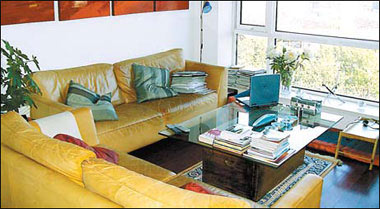
Dutchman Piet Bos is ready to cash in by providing homestay packages to tourists coming for the Beijing Olympics. Chris Hyde
For many Beijing expatriates, the looming Olympic Games is something of a holy grail, an unmatched career opportunity and the ultimate excuse to party in their adopted homeland. But some foreigners are preparing to bypass the chaos in August, vacating their homes in order to collect fees of up to 3,000 yuan ($420) per night - or even more - from tourists seeking an alternative to hotel accommodation.
While Beijing tourism authorities last month stepped up a campaign to recruit some 1,000 Chinese households as "Olympic family hotels", hundreds of foreigners have already reached private agreements to become homestay hosts, either through specialized agencies or direct negotiations with tenants.
Enterprising Dutchman Piet Bos established the online agency, Homestay Beijing 2008 (www.homestaybeijing2008.com) last March, recognizing the potential windfall to be made accommodating the 2 million tourists - including 500,000 overseas guests - expected to make their way to the Chinese capital for the Olympics. The largest daily inflow of visitors for the Summer Games is estimated at 300,000.
Bos, a hospitality industry consultant who has lived in China for 10 years, says Beijing's booming expat community includes many individuals who live in large apartments with at least one extra guest room. Many also employ ayi to cook and clean as well as drivers and translators - extra services that can be offered as part of homestay packages attracting higher rates.
And because expats are most likely to share their language and culture with international visitors, Bos says they make particularly suitable hosts.
Homestay Beijing 2008 requires landlords to be fluent in both written and spoken English, in order to eliminate some of the communication problems frequently experienced by overseas tourists in China.
"The landlord will be able to give relevant, up-to-date and non-sponsored information to the guests," Bos says.
"Go to any 4- or 5-star hotel and ask information from the concierge, and you will have difficulties getting what you want, if you can communicate at all!"
"(There is) also the fact that most expat homes look and feel more like suitable homes for overseas visitors and the cultural aspect of it counts, too," he adds.
Over the past months, Bos has appealed to homeowners and tenants in all districts of Beijing to sublet their homes for handsome profit under his scheme: "Imagine renting out your accommodation for the 15 days of the Olympics and making back the rent of three months. You could finally go to visit the place where you always wanted to go while the rest of Beijing is busy with the Olympics!"
Bos operates Homestay Beijing 2008 in tandem with his tour company, Beijing Daytrips.
"Each home is different, (but) as a rule of thumb, the current rate we use to establish pricing for homestays is 500-750 yuan per person that can stay in the apartment per day. In other words, if you have a two-bedroom apartment, where a maximum of four people can stay, then the average price per night is 2,000-3,000 yuan," he says.
"Mind you, these prices are what I advise landlords. In the end, they have to decide for themselves what they want to charge to make it worth their while to have strangers stay in their home."
While many homestay landlords plan to put the extra cash towards a vacation or visiting family and friends overseas while their home is occupied, others will stay in Beijing but share their home during the Games.
For Olympic visitors, homestay accommodation can be more affordable than staying in a hotel, as well as providing greater living space and a more localized experience of life in the Chinese capital.

An available apartment listed on Piet Bos' website. File Photo
Homestay Beijing 2008 now has about 400 available properties listed on its site, with short profiles, photographs and additional information for each, for example whether or not the landlord allows children to stay.
The website's advertised rate for a traditional courtyard house in a Dongcheng District hutong is 7,500 yuan ($1,050) per night, with a minimum stay of 20 nights. Or for 5,000 yuan ($700) per night, visitors can secure a two-bedroom unit on the 10th floor of a luxury complex in Chaoyang District.
Meanwhile, local expat websites such as Beijing Community (www.beijingcommunity.com) have also become forums for individuals to reach private homestay agreements.
The site has a dedicated thread for those looking to make contact with potential tenants from overseas before August. They include Julian Fisher, a Londoner teaching history in Beijing who rents his one-bedroom flat in the city center for less than 3,000 yuan ($420) per month. Fisher has arranged to sublet his apartment to American Lee Rindge during the fortnight of the Games.
"He said hotels were charging up to 400 pounds (5,627 yuan) a day, so I offered my flat for 150 pounds (2,110 yuan) a day for two weeks," Fisher told London's Sunday Times newspaper.
Bos says interest from prospective overseas tenants has picked up later than expected. But he predicts demand will continue to climb as Olympic ticketing is finalized. Affordability has been the greatest determiner of demand for homestays, while proximity to Games venues is also highly sought. Homestay Beijing 2008 is currently seeking hutong accommodation to let.
Expat-led schemes such as Bos' operate independently from a wider drive to facilitate homestay accommodation for the Olympics in order to supplement a potential shortage of hotel rooms. In January, the Beijing Tourism Administration announced the recruitment of 1,000 local households as "Olympic family hotels".
The administration's deputy director Xiong Yumei says the capital has 806 star-ranked hotels housing 130,000 rooms with 220,000 beds. Other lodging houses and inns can provide an additional 646,000 beds.
"The guest room supply may still fall short of demand, especially for hotels close to the sports venues," Xiong told Xinhua News Agency.
According to recent forecasts from the tourism administration, a five-star hotel room during the Games would cost about 2,960 yuan ($414) per night. Four-star hotel rooms are expected to cost 2,320 yuan ($325) per night, while a room in a three-star hotel is forecast at 1,600 yuan ($224) per night. Two-star accommodation is expected to cost 1,200 yuan ($168) per night for one room.
But actual rates could be even higher, with the five-star Kunlun Hotel in August announcing its deluxe room rate would rise from 1,280 yuan ($180) to 12,000 yuan ($1,680) per night during the Games. The hotel allocated 70 percent of its rooms to accredited clients of the Olympic Family.
(China Daily via Viva Goldner February 23, 2008)